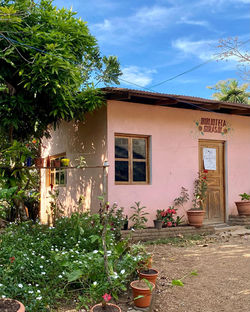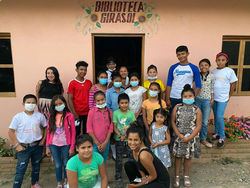Biblioteca Girasol -
Matapalo Community Library Water Project
~ Nicaragua
At WaterBridge Outreach we have invested in water projects in Haiti, India and Tanzania over the years. Now, we are thrilled to announce our newest water project in Nicaragua, for the youth-led Biblioteca Girasol to improve their water access. We are once again partnering with The Chain Collaborative, whom we’ve collaborated with on literacy projects at the Now Africa Library at Karama Education Center in Uganda.
The Chain Collaborative's new Community-Led Development Incubator program, will be investing in local leaders in coffee communities around the world as they design and lead projects in their own communities. One of these incubator projects is the youth led Biblioteca Girasol, a community library in the 500-person, coffee-growing community of Matapalo in Matagalpa, Nicaragua.
The library is run by a team of 12 volunteer youth leaders and three coordinators, all of whom are from the community they serve. Since their founding in 2018, the Biblioteca Girasol team not only provides books to the community, but has offered a wealth of opportunities, from art and homework classes to mental health workshops and counseling for Matapalo community members. The youth leaders have also started a community garden and participated in youth exchanges with other Nicaraguan teens in other communities.
For 2022-2023 one of Biblioteca Girasol's initiatives, a project to improve water access will be funded by WaterBridge Outreach. Matapalo has a self-organized water committee that established a potable water system 15 years ago. At that time, only 300 people lived in Matapalo and the water system was only designed to serve that small population. The inhabitants of the community have since doubled, and in order to maximize water access, water only runs in Matapalo for two hours per day. The water supply is so limited that new families in Matapalo are unable to set up water lines to their homes. However, expanding the current water system can help.
To expand the system, the Matapalo Water Committee will have a water engineer conduct a study of the community and identify additional water sources. Depending on the results, installing a new water well or putting in an additional storage water tank will be implemented. With the community’s existing water pump and resources for water lines in place, expansion for new homes and more water storage will provide water for more hours per day and reach more families.
With funds from WaterBridge Outreach, and support from The Chain Collaborative and their Community-Led Development Incubator program, this improved water access program will benefit Matapalo for generations to come.
UPDATE: FALL 2022
A water engineer was hired and carried out an assessment of the lands and identified underground water sources, while community members with construction experience put together a budget for the dig. To confirm the final plan, a group meeting was held and each family donated the equivalent of $7 USD to cover the costs of the manual labor for the project, providing an important counterpart to WBO's financial contribution. Upon identifying the best new water source, the team of workers installed an underground water tank to retain the water and connect it to the community’s existing water line.
The result of this project has ensured running water for existing homes at least twice per day, while also connecting new homes in their growing community to the system. Before, water ran for only two hours per day. Now, the 600 residents of Matapalo are experiencing improved access to drinking water and better conditions for sanitation. Beyond the initial impact of accessing more water have come other blessings. Since water is available into the evenings, water barrels can be filled at night, and children won’t need to wake up at 5 am to fill their families’ water barrels for the day. With more hours of sleep and less family labor, these children can focus more on their schooling. Similarly, women will face a lesser burden in the mornings, as their water-heavy tasks (such as dish and clothes washing) can now be done at different points during the day. Lastly, since the Matapalo water committee identified multiple potential water locations on their land, they now feel more prepared to advance their work into the future and connect families to additional water sources.
 |  |  |  |
|---|---|---|---|
 |  |  |  |

